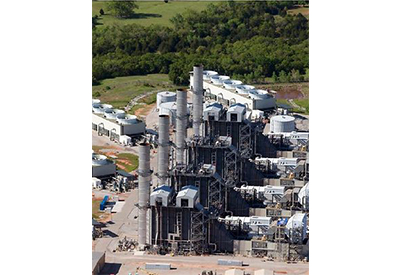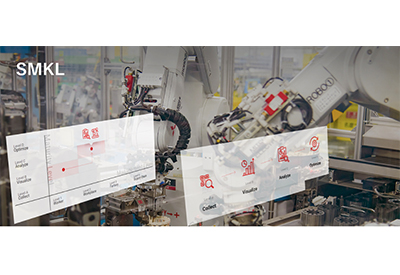ABB Launches Industry-First Smart Factory Solution for Safer, More Autonomous and Efficient Steel Melt Shop Operations
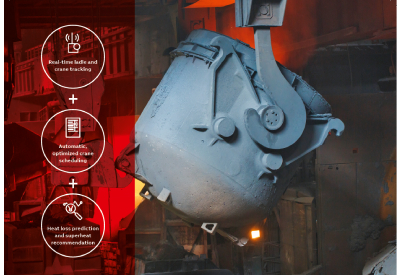
November 29, 2021
- ABB Ability™ Smart Melt Shop digitally connects all steel melt shop processes and moving equipment to synchronize operations and improve production efficiencies, moving steelmakers towards autonomous operations.
- The new digital application automates and optimizes ladle and crane movements in steel melt shops enabling metals producers to closely track and schedule the transport of molten metal from furnace to caster.
- The solution has already been installed by JSW Steel Ltd, India’s leading steel company.
Pioneering technology leader ABB has launched ABB Ability™ Smart Melt Shop, the first smart factory digital application of its kind for the metals industry. It is designed to increase melt shop productivity, save energy, and improve employee safety, with payback within six months.
Based on advanced digital algorithms, the new solution is unique in that it offers not only powerful real-time ladle tracking but also automated crane scheduling and a predictive thermal modelling engine. The tracking engine follows ladle movement via cranes and transfer cars in real time. Radar and laser positioning technologies provide accurate visualization while reducing hardware footprint and maintenance needs compared to radio-frequency identification (RFID) solutions. The automated crane scheduling includes job forecasting, route planning and automatic acknowledgement of jobs.
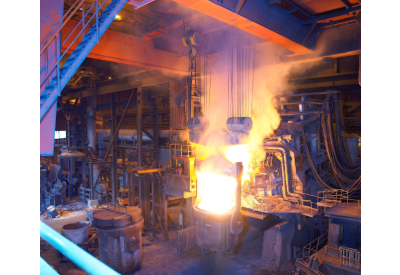
This will enable steelmakers to move towards autonomous operations by eliminating manual co-ordinations, with increased safety in hot zones due to lower footfall.
The thermal engine function uses ladle thermal history from the tracking engine and forecasted heat movement from scheduling engines to predict the thermal loss during ladle transfer and predicts the correct lift temperature at ladle furnace. This results in better superheat compliance at the caster, eliminating caster slowdowns, hence increasing productivity.
Steelmakers can expect ABB Ability™ Smart Melt Shop to help increase superheat compliance to enable 4-5 percent higher casting speeds to improve productivity and reduce arcing by 5 degrees Celsius per heat in ladle furnaces for increased energy and cost efficiency.
ABB Ability™ Smart Melt Shop has already been installed by JSW Steel Ltd, India’s leading steel company, where it has been integrated into a wider expansion at Dolvi Works plant in Maharashtra state. It is expected to increase the company’s EBITDA profit by around $2million per annum through 4 percent higher casting speeds, time savings of one working day per month and additional output equating to 24,000 tons a year.
“We’re proud to launch ABB Ability™ Smart Melt Shop – the first of its kind in the metals industry, enabling steelmakers to digitally connect all processes and moving equipment in the melt shop, achieving synchronized operations and removing bottlenecks in production capacity,” said Tarun Mathur, Global Product Manager, Metals Digital, ABB. “The digitalization of core processes will drive new levels of productivity, safety and sustainability outcomes for the metals sector.”
This application uses all standard communications protocols, employs ABB’s multi-layered defense-in-depth approach to cyber security and is compatible with both ABB and third-party systems.
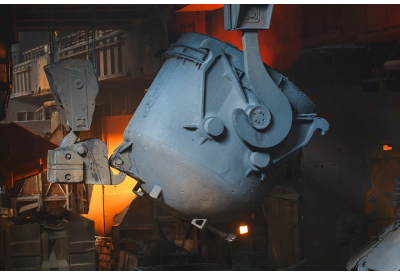
Benefits of the new ABB Ability™ Smart Melt Shop include:
Productivity
- 4-5 percent increased casting speed due to better superheat compliance.
- Reduced tapping delays, in EAF or converter due to more efficient scheduling of cranes for ladle movement.
- Better ladle management and maintenance planning thanks to access to historical data on all movements.
- Increased manpower productivity since no manual intervention or acknowledgement is required.
Energy efficiency
- 5 degrees Celsius less arcing per heat (batch) in ladle furnace using thermal models to accurately predict target lift temperature.
- Improved decision-making thanks to forecasting of ladle movements and crane schedules.
Safety
- Increased safety with less footfall in hot zones which would otherwise be needed to manage ladle and crane movement.


